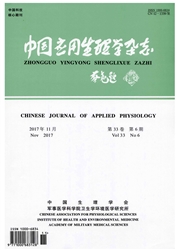

 中文摘要:
中文摘要:
目的:探讨模拟高原低氧环境对人认知灵活性的影响。方法:低氧舱模拟海拔3600m低氧环境,采用任务转换范式观察低氧模拟各阶段的认知灵活性,同时监测焦虑状态及基本生理指标的变化。23名无高原生活经验、平均年龄25.1岁的男性受试者参加了实验。结果:与低氧暴露1个月后的基础对照相比,低氧阶段的反应时转换损失显著增加;低氧阶段焦虑水平显著高于适应阶段;在适应阶段,焦虑水平与反应时转换损失显著负相关;而在降舱阶段,焦虑水平与反应时转换损失显著正相关。结论:中度低氧暴露影响人的认知灵活性和焦虑状态;低氧暴露前,焦虑可促进个体的认知灵活性;低氧暴露后,焦虑会阻碍个体的认知灵活性。
 英文摘要:
英文摘要:
Objective: To explore the effects of high altitude on cognitive flexibility. Methods: Simulated hypoxia at an altitude of 3 600 m was performed in a hypobaric chamber. Twenty-three volunteers without hypoxic experience were selected and the mean age was about 25.1 years. The physiological parameters (heart rate, blood pressure and oxygen saturation) were measured. Task switch paradign was used to explore the cognitive flexibility in each phase, and the changing anxiety state was evaluated simultaneously. Results: Reaction time (RT) switch cost in hypoxia phase showed a significant increase compared with the baseline; anxiety level in hypoxia phase was higher than the adap tation phase; a remarkable negative correlation between anxiety level and RT switch cost was found in adaptation phase, whereas a positive correlation was found in landing phase. Conclusion: High altitude (3 600 m) affects cognitive flexibility and anxiety state. Anxiety before the hy poxia expesure improves the cognitive flexibility performance, while anxiety after the hypoxia exposure hampers the performance because of the post-hypoxia effect.
 同期刊论文项目
同期刊论文项目
 同项目期刊论文
同项目期刊论文
 期刊信息
期刊信息
